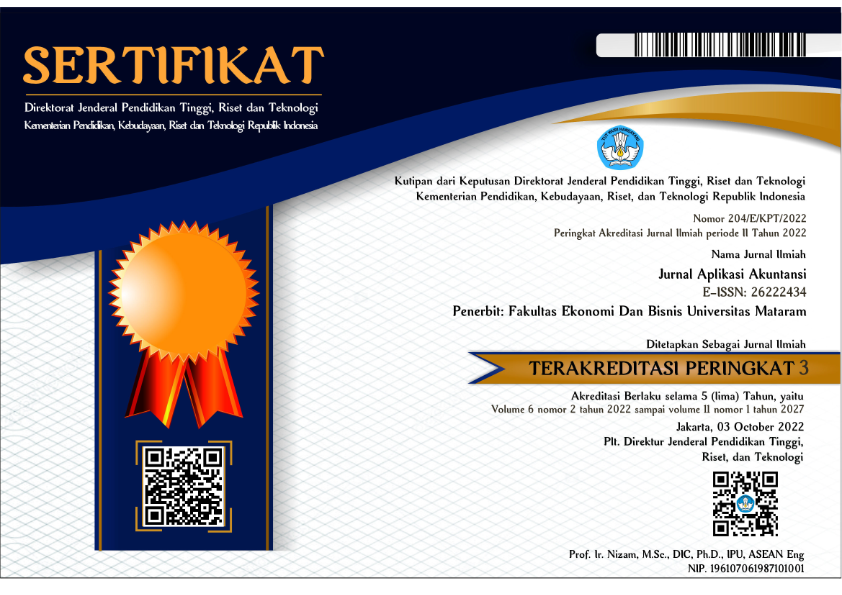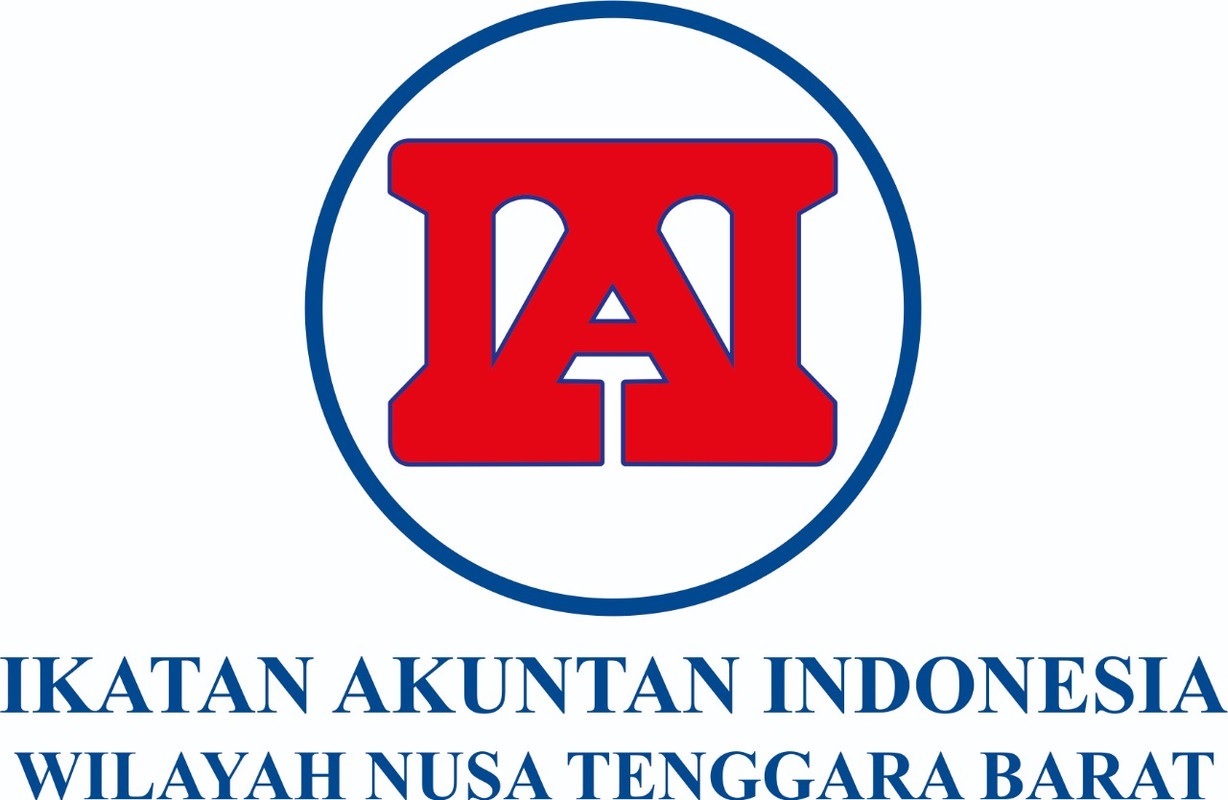PENGARUH EFEKTIVITAS PENGENDALIAN INTERNAL, MORALITAS INDIVIDU, DAN KEADILAN ORGANISASI TERHADAP KECENDERUNGAN KECURANGAN AKUNTANSI
DOI:
https://doi.org/10.29303/jaa.v8i2.340Keywords:
effectiveness of internal control, individual morality, distributive justice, procedural justice, the tendency of accounting fraudAbstract
This research aims to examine the influence of the effectiveness of internal control, individual morality, distributive justice, and procedural justice on the tendency of accounting fraud in the OPD of Dompu Regency. The population in this study were all civil servants who worked at the OPD in Dompu Regency. This research sample was determined using the method purposive sampling with the criteria of officials who are responsible for regional financial management in 30 OPDs in Dompu Regency. The data in this research was obtained by distributing questionnaires to 120 respondents in 30 OPDs. Structural Equation Modeling (SEM) with SmartPLS 3.0 used for data analysis. The results of this research indicate that the effectiveness of internal control and procedural justice have a negative and significant effect on the tendency for accounting fraud. Meanwhile, individual morality and distributive justice do not have a significant effect on the tendency for accounting fraud. It is hoped that this research can contribute to additional literature regarding motives for action tendenciesfraud involving ASN, in terms of conceptfraud triangle theory andmoral development theory. Apart from that, the results of this study can provide additional information as input to the Dompu Regency Government in reducing or preventing the tendency of accounting fraud
References
Abdullahi, R., & Mansor, N. (2018). Fraud prevention initiatives in the Nigerian public sector: understanding the relationship of fraud incidences and the elements of fraud triangle theory. Journal of Financial Crime, 25(2), 527–544. https://doi.org/10.1108/jfc-02-2015-0008
ACFE. (2019). Survei Fraud Indonesia 2019.
Adinda, Y. M., & Ikhsan, S. (2015). Faktor yang Mempengaruhi Terjadinya Kecurangan (Fraud) di Sektor Pemerintah Kabupaten Klaten. Accounting Analysis Journal, 4(3), 1–9. https://doi.org/10.15294/aaj.v4i3.8311
Batkunde, A. A., & Dewi, P. M. (2022). Pengaruh Moralitas Individu Dan Ketaatan Aturan Akuntansi Terhadap Kecenderungan Kecurangan Akuntansi Pada Pemerintah Kota Ambon. Owner: Riset Dan Jurnal Akuntansi, 6(3), 2819–2829. https://doi.org/10.33395/owner.v6i3.917
Cressey, D. R. (1953). Other People’s Moneynn: A Study in the Social Psychology of Embezzlement. Glencoe, Ill, Free Press.
Data Indonesia. (2022). Kejaksaan Agung tangani 371 kasus korupsi sepanjang 2021.
detikbali.com. (2022). Kejari Geledah Kantor Disperindag Dompu Dugaan Korupsi Rp 1,5 M.
Didi, & Kusuma, I. C. (2018). Faktor-Faktor Yang Berpengaruh Terhadap Kecenderungan Kecurangan (Fraud): Persepsi Pegawai Pemerintahan Daerah Kota Bogor. Jurnal Akuntansi Dan Keuangan Indonesia, 15(1), 1–20. https://doi.org/10.21002/jaki.2018.01
Fernandhytia, F., & Muslichah. (2020). The Effect of Internal Control, Individual Morality and Ethical Value on Accounting Fraud Tendency. Media Ekonomi Dan Manajemen, 35(1), 112–127. https://doi.org/10.24856/mem.v35i1.1343
Ghozali, I., & Latan, H. (2015). Partial Least Squares Konsep, Teknik dan Aplikasi Menggunakan Program SmartPLS 3.0 Untuk Penelitian Empiris (Edisi 2). Badan Penerbit Universitas Diponegoro.
Indriastuti, D. E., Agusdin, & Animah. (2017). Analisis Pengaruh Asimetri Informasi, Pengendalian Internal, Persepsi Kesesuaian Kompensasi, Moralitas Individu, Dan Ketaatan Aturan Akuntansi Terhadap Kecurangan Akuntansi. InFestasi, 12(2), 115. https://doi.org/10.21107/infestasi.v12i2.2763
Kamal, A., Gustiningsih, D. A., Mediaty, Habbe, A. H., & Arifuddin. (2019). The Factors of Fraud Trends in Public Sector in Makassar City. Advances in Economics, Business and Management Research (AEBMR), 92, 85–94. https://doi.org/10.2991/icame-18.2019.9
Khoiriyah, L., Asyik, N. F., & Amanah, L. (2019). Dampak Locus of Control pada Moralitas Individu dan Pengendalian Internal terhadap Kecenderungan Kecurangan Akuntansi Abstrak. JAAF (Journal of Applied Accounting and Finance), 3(2), 108–123. https://doi.org/10.33021/jaaf.v3i2.805
Kiswanto, Widhiastuti, R., Agustina, L., & Rahma, A. N. (2020). Roles of unethical behavior in mediting the influence of internal control system, distributive justice, and accounting rules compliance towards accounting fraud behavior. International Journal of Scientific and Technology Research, 9(3), 62–71.
Kohlberg, L. (1971). Stages of Moral Development as a basis for moral education (B. C. & E. S. Clive Beck (ed.)). University of Toronto Press.
Komala, R., Piturungsih, E., & Firmansyah, M. (2019). Pengaruh Asimetri Informasi, Moralitas Individu Dan Pengendalian Internal Terhadap Kecenderungan Kecurangan Akuntansi. E-Jurnal Akuntansi, 29(2), 645–657. https://doi.org/10.24843/eja.2019.v29.i02.p12
kpk.go.id. (2022). Tindak Pidana Korupsi Berdasarkan Instansi.
Kurrohman, T., Lailiyah, A., & Wahyuni, N. I. (2017). Determinant of Fraudulent in Government: An Empirical Analysis in Situbondo Regency, East Java, Indonesia. International Journal of Economics and Management, 11(1), 133–140.
Mappadang, A. (2022). Motivation Of Fraud: Internal Control System, Organizational Justice, Compensation, And Information Asymmetry. Jurnal Akademi Akuntansi, 5(1), 135–148. https://doi.org/10.22219/jaa.v5i1.19677
Mat, T. Z. T., Ismawi, D. S. T., & Ghani, E. K. (2019). Do perceived pressure and perceived opportunity influence employees’ intention to commit fraud? International Journal of Financial Research, 10(3), 132–143. https://doi.org/10.5430/ijfr.v10n3p132
mataram.antaranews.com. (2023). Kejari meningkatkan dugaan korupsi anggaran Dishub Dompu ke penyidikan.
Meurah, T., Yusmita, F., & Darwanis, D. (2022). The Effect of Organizational Commitment, the Effectiveness of Internal Controls, Law Enforcement, Love of Money, and Information Asymetries on Fraud (Empirical Study on SKPD of North Aceh Regency Government). Budapest International Research and Critics Institute-Journal (BIRCI-Journal), 5(1), 7205–7217. https://doi.org/10.33258/birci.v5i1.4451
Murti, N. W., Sujana, E., & Kurniawan, P. S. (2018). Pengaruh Sistem Pengendalian Internal, Profesionalisme Badan Pengawas, Moralitas Individu, dan Keadilan Prosedural Terhadap Kecenderungan Kecurangan (Fraud) (Studi Empiris Pada LPD Se-Kecamatan Susut Kabupaten Bangli). JIMAT (Jurnal Ilmiah Mahasiswa Akuntansi) Undiksha, 9(2), 31–45. https://doi.org/10.23887/jimat.v9i2.20433
Nurlaeliyah, S., & Anisykurlillah, I. (2017). Analysis of Factors Affecting the Tendency of Accounting Fraud with the Mediation of Ethical Behavior. Accounting Analysis Journal (AAJ), 6(2), 229–241. https://doi.org/10.15294/aaj.v6i2.16892
Oktavia, D., Astuti, T. P., & Harjito, Y. (2020). Faktor-Faktor Yang Mempengaruhi Kecurangan Di Pemerintah Kabupaten Klaten. Accounting Global Journal, 4(1), 17–35. https://doi.org/10.24176/agj.v4i1.4592
Pattiasina, V., Sutisman, E., Febriani, Patiran, A., & Tamaela, E. Y. (2022). The Effect of The Effectiveness of Internal Controls, Accounting Rules Compliance, Appropriate Compensation, Management Morality, and Organizational Ethical Culture toward Accounting Fraud Trends in Jayapura District Government. Kompartemen : Jurnal Ilmiah Akuntansi, 20(1), 63–82. https://doi.org/10.30595/kompartemen.v20i1.12369
Permana, B. A., Perdana, H. D., & Kurniasih, L. (2017). Determinant of Fraud in Government Agency: Empirical Study At the Finance and Development Supervisory Agency (Bpkp) of Jakarta Representative Office. Asia Pacific Fraud Journal, 2(1), 93–108. https://doi.org/10.21532/apfj.001.17.02.01.08
Prabowo, H. Y., & Cooper, K. (2016). Re-understanding corruption in the Indonesian public sector through three behavioral lenses. Journal of Financial Crime, 23(4), 1028–1062. https://doi.org/10.1108/JFC-08-2015-0039
Prambudi, R., Dewangkoro, B., & Dwimulyani, S. (2017). Analisis Faktor-Faktor Yang Mempengaruhi Terjadinya Kecurangan Pada Sektor Pemerintahan (Studi Penelitian Pada Kementerian Perdagangan). Jurnal Magister Akuntansi Trisakti, 4(2), 209–228. https://doi.org/10.25105/jmat.v4i2.5067
Putri, P. A. A., & Irwandi, S. A. (2016). The Determinants of Accounting Fraud Tendency. The Indonesian Accounting Review, 6(1), 99–108. https://doi.org/10.14414/tiar.v6i1.857
Rantung, D. I., Oroh, N. S., & Prayanthi, I. (2023). Factors Affecting the Unethical Behavior and its Impact to the Tendency of Accounting Fraud. International Journal of Professional Business Review, 8(5), 01–25. https://doi.org/10.26668/businessreview/2023.v8i5.1464
Said, J., Alam, M. M., Ramli, M., & Rafidi, M. (2017). Integrating ethical values into fraud triangle theory in assessing employee fraud: Evidence from the Malaysian banking industry. Journal of International Studies, 10(2), 170–184. https://doi.org/10.14254/2071-8330.2017/10-2/13
Sulistyawati, A. I., Santoso, A., Rosyati, Indarto, & Nugroho, A. H. D. (2023). Determinants Of Accounting Fraud Trends With Un Ethical Behavior As Mediation. Jurnal Akuntansi, 27(1), 99–117. https://doi.org/10.24912/ja.v27i1.1234
Transparency International. (2021). Corruption perceptions.
Wijaya, W. R. (2021). The Influence of Compensation Suitability, Effectiveness of Internal Control, and Individual Morality on Tendency of Accounting Fraud. Jurnal Informasi, Perpajakan, Akuntansi, Dan Keuangan Publik, 16(1), 101–118. https://doi.org/10.25105/jipak.v16i1.7208
Wulandari, R., & Suryandari, D. (2016). Faktor-Faktor Yang Mempengaruhi Fraud Pada Satuan Kerja Pemerintah Daerah Kabupaten Temanggung. Accounting Analysis Journal, 5(2), 76–85. https://doi.org/10.15294/aaj.v5i2.14363
Downloads
Published
How to Cite
Issue
Section
License
Copyright (c) 2024 Yulia Kartika, Biana Adha Inapty, Iman Waskito

This work is licensed under a Creative Commons Attribution-NonCommercial-ShareAlike 4.0 International License.









